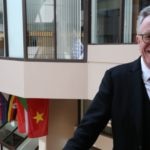The Frontiers Awards honor the economist who revolutionized the fight against poverty
Australian economist Martin Ravallion has been distinguished with the BBVA Foundation’s Frontiers of Knowledge Award in Development Cooperation for revolutionizing the fight against poverty by creating reliable indicators to measure it. In 1991 he established at one dollar a day the minimum amount that a person needs to survive, which helped establish for the first time specific goals to eliminate extreme poverty globally. After the latest update, the international poverty line is set at US$1.90 a day.

To illustrate the importance of Ravallion’s contribution, the jury cited Lord Kelvin’s phrase to the effect that “what cannot be measured cannot be improved.” Australian economist Martin Ravallion – who worked at the World Bank between 1988 and 2012 and was head of its studies service during the last six years of that period - was recognized with the Frontiers of Knowledge Award for his pioneering work in the measurement of poverty with internationally applicable indicators.
The threshold of poverty proposed by Ravallion has been universally accepted, because “the absolute minimum,” explained Ravallion himself after hearing of the prize. “If we are looking for a global standard we need to focus on the minimum levels of the poorest countries.” Everybody agrees that anything under that cannot be reasonable to survive”, he continues. The latest update of the threshold value, dating from 2012, put it at 1.90 dollars/day.
Poverty, it continued, was previously referred to in abstract or subjective terms, “and there was even reluctance to admit that it could be objectively measured.” Now, however, the metrics provided by the laureate’s work, “have allowed the design of more clearly targeted polices to combat extreme poverty or even aim at its elimination,” as the Jury’s report underscores.
A research rooted in his humble origins
Ravallion (Australia, 1952) is currently an Edmond D. Villani Chaired Professor of Economics at Georgetown University (U.S.). When he joined the World Bank, in 1988, there were very few economists conducting any kind of research on how to measure poverty; today, there are hundreds of them, thanks to a large extent to the work that Ravallion started.
His research has its roots in his own background. Born in Australia in 1952 to a family of very limited means, he remembers receiving welfare benefits, and deciding then that “I didn’t want to be poor.”
In this video you can watch the first interview given by Ravallion after learning about the award
The Millennium Goals, or the more recent Sustainable Development Goals, have drawn on these metrics to define their objective: Eradicating extreme poverty by 2030. A goal regarding which our new Frontiers of Knowledge Awardee remains optimistic: “We’re on the right road – he stated yesterday – considering the progress made by many developing countries in the last few decades.”
He warns, however, that there are threats along the way: climate change, the global recession and growing inequality. And although it is possible to reduce extreme poverty while the income gap grows, “inequality may prevent a billion people from being lifted out of poverty in the next fifteen years.”
This relationship between economic growth and poverty is, precisely, another one of Ravallion’s essential contributions. Through economic readings in a number of countries, Ravallion proved that growth is a necessary condition for poverty mitigation, but one that may not always suffice on its own, especially in situations of high income inequality and unequal access to public services like education and healthcare. In these cases it is essential to implement adequate social policies.
Agriculture, a key sector to eradicate extreme poverty
Ravaillon has also analyzed what sectors are more important in the fight against poverty. His research in China and India convinced him that improvements in agriculture hold the key to alleviating extreme poverty, bringing immediate and substantial benefits in countries where most people live off the land in rural areas.
And the importance of agricultural productivity is no less marked in other latitudes, since over 70 percent of the world’s population is located in rural areas. Ravallion has also observed the “urbanization” of poverty, condemning policies that limit farming yet are at the same time hostile to migrants from rural communities.